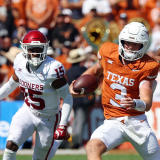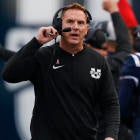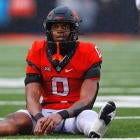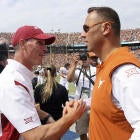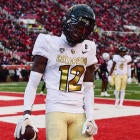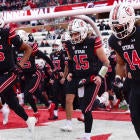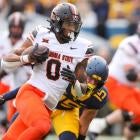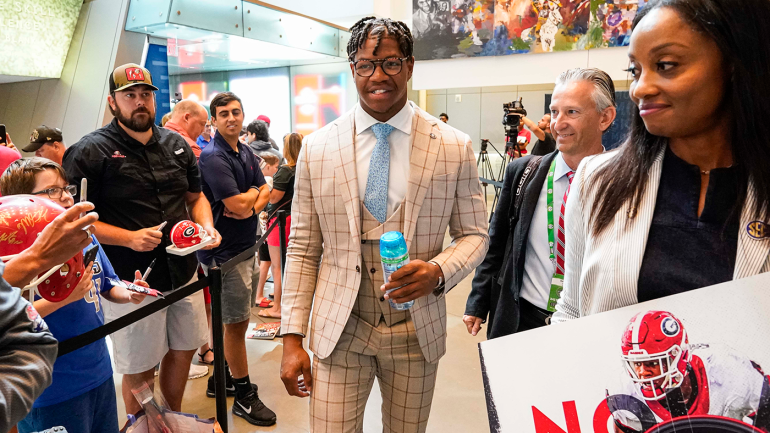
The Zoom call blinked to life Thursday afternoon. On it were a representative from Drew Rosenhaus' agency and a former top-ranked national recruit now in his second college season along with that recruit's father and his family's financial advisor. What followed was a name, image and likeness business pitch unlike you've heard before, one that will possibly blow your mind.
The call was led by a 36-year-old former pitcher for Virginia and Philadelphia Phillies who was once recruited in basketball by Mike Krzyzewski. To say Michael Schwimer is a force of nature would insult nature.
During the call, the founder of Big League Advantage (BLA), spoke at a staccato pace that would make the chatty Jimbo Fisher blush. Pay attention? You don't have a choice with seven figures being thrown around to certain college football players -- for free.
Well, free-ish. In the BLA model, an athlete gets to keep every cent if, as Schwimer explains, "you decide to become a doctor."
"The money is yours. There's no payback," Schwimer told the Power Five starter. "There's no stipulations. There's no fine print if you don't make it."
There's also no way this can be true in the wildly imaginative NIL world, and yet, it's permissible. The Alston v. NCAA decision last year opened the door for BLA to basically to offer college athletes points -- up-front money -- in exchange for a percentage of future income and some minor NIL activities.
Editor's note: CBS Sports agreed not to reveal the identity of certain participants in exchange for viewing the call.
"BLA is not a loan that you need to pay back," its website states.
Imagine that pitch to college athletes. However, hitting on the right prospect -- to make a profit -- requires something more than a roulette wheel.
Among the six college football players signed to date, Schwimer's highest-profile prospect -- in the NIL part of the business that launched Monday -- is Georgia preseason All-SEC linebacker Nolan Smith Jr. BLA's college recruiting has only begun.
"They're making a bet on you," the financial advisor from RBC Wealth Management explained to his client during that Zoom call. "They're thinking you're the next Apple computer or the next Google or the next Microsoft."
The outstanding question: Does the player want to bet on himself?
BLA is hoping to change how you think about NIL. It is NCAA compliant and possibly revolutionary. Think of BLA as a sports predictive analytics version of Warren Buffet. The billionaire made his fortune investing in sometimes speculative businesses.
Or think of it as the Nike/Adidas grassroots basketball complex. All those camps, all that seed money, all those shoes? They are all in the name of finding the next Kobe Bryant. The athlete investment model has actually been around for a while.
Businesses/friends/family routinely invest in young golfers. If they make it on the professional tours, they send back a percentage of their winnings to those investors. Speculative investing in boxers has been around for decades.
BLA has the approximate model. It launched seven years ago, mostly signing minor-league baseball players (about 450 to date) who would surrender a portion of their future earnings for an immediate lump sum. In exchange, players chose to give from 1% to 15% of their future salaries in perpetuity on a sliding scale. You want more money up front? You give up a higher percentage.
"We're in the same financial position as an agent," Schwimer said proudly. "You [sign] 10 guys. Two make it, eight don't, you're making a ton of money."
Not surprisingly, five of six BLA signees are from the SEC, including Arkansas transfer wide receiver Jadon Haselwood and Florida's Gervon Dexter, the No. 1 defensive tackle in 2020, per 247Sports. Another 23 players approached are still deciding.
It's less about the numbers at this point than more about the process. Schwimer is proud to say he uses layered regression, Bayesian-type statistics and neural networks to evaluate players. Don't we all?
Ah, but on the human side, Schwimer's chief technical officer is from NASA. Marvin Bush, brother of former president George H.W. Bush, was once a board member. One of the analysts used to be in operations for the New York Jets. Some analysts even have doctorates in political science.
"They've never worked in sports, ever," Schwimer said.
BLA had seven players in last month's baseball MLB All-Star Game and eight more in the Futures Game, Schwimer boasted. Of the seven all-stars, six were not among the top 300 prospects when they were signed. He will not name any of them. Schwimer says he has signed 43 players who have received at least a $1 million signing bonus.
About 10% of baseball prospects make the majors. It's even harder to evaluate college football prospects. Only 1.2% of college players even get drafted.
"This NIL stuff doesn't come close to [being] far enough," Schwimer said. "What other aspects of life do you have where the people that are 95% responsible for the revenue creation are getting zero profits?"
BLA is betting Smith will go high in the first round of the 2023 NFL Draft. Smith has already played on perhaps the best college defense in the last 20 years, winning a national championship with the Bulldogs last season.
At 235 pounds, the senior's game seems to project to being the hybrid defender every college and NFL coach covets. In addition to 9.5 tackles for loss (second on the team), Smith blocked a punt for a safety against Missouri. In one 39-second span against Florida, he forced a fumble, recovered it and intercepted a pass. Smith might be light, but Schwimer's analytics show the linebacker plays the run like a 265-pounder.
"We think Nolan is tremendously underrated," Schwimer said. "There's one draft board that has him seventh or eighth overall. One has him the fifth-best outside linebacker. We have him much, much higher. Our models had him as the best pass rusher all year. We would have taken him in the first round last year."
This versatile player has a smile as wide as Savannah, Georgia, his hometown.
"Big Mike," Smith said proudly at SEC Media Days. "We got a relationship."
By signing up, Smith has already accepted $5,000 from BLA that was donated to his favorite charity. It went to a youth camp in Savannah to cover registration fees for the campers.
"Look what they did for me," Smith said in a BLA promotional video. "They were able to make my camp free. The impact you can have on somebody else's life is important."
The athleticism of the now-veteran snow skier was noticed the minute he started taking lessons.
"Technically," Smith told the trainer the day of his first lesson, "I play college football for a living."
The trainer replied: "I can tell."
"It's like pass rushing," Smith explained at SEC Media Days. "All you do is flip your hips. Once you figure that out, [it's easy]."
That's part of the quid pro quo aspect of BLA that makes it NIL compliant. Unlike some collectives, there is no attachment to any particular school. As part of the deal, players agree to one social media post per month, two player appearances and two content shoots. BLA requires each player have their own lawyer review the contract before signing and encourages family and financial advisors to take part.
Judge for yourself whether it's all worth it: Alabama LB Will Anderson Jr. might get a call from BLA, but why not wait a year and save money when he could be the No. 1 player in the draft? Oregon offensive lineman Jeff Forsyth told CBS Sports he got a six-figure offer from BLA that he deemed not worth it for the future salary that would be given up in exchange.
Schwimer is most known for signing San Diego Padres superstar shortstop Fernando Tatis Jr. He did so five years ago when Tatis was in Class AA coming out of the Dominican Republic. The budding star didn't need the money. His father, Fernando Tatis Sr., earned $18 million during a 11-year major league career.
"But he didn't have to go through a lot of things that I had to go through when I didn't have no money, didn't have nobody," Tatis Sr. said.
Tatis Sr. gushes about BLA. The father said his son having the money up front taught him responsibility. The younger Tatis invested his BLA funds, earned well and now owns a business in the Dominican Republic flipping houses according to his father.
Tatis Jr. became the poster child for BLA when he signed a 14-year, $340-million contract with the Padres in 2021. Schwimer won't discuss his investment, but let's take the middle ground and say Tatis Jr. signed away 8% of his future earnings. BLA would have gotten more than $27 million off that contract alone.
BLA has yet to turn a profit, but it's early in the life of what amounts to an athletic hedge fund.
"The only thing these people do is give you a better life," Tatis Sr. said. "I believe everyone wants to be comfortable at a young age."
Tatis Sr. detailed the grinding minor league life his son avoided. That included walking "miles" to the grocery store in the low minors (Charleston, South Carolina) making $400 every two weeks.
"Those days you had to keep your eyes on the field and on the parking lot," Tatis Sr. said. "You'd go back and you find just the wheels."
Judging by coaches interviewed at various media days, few are aware of BLA.
"I always worry, when you're dealing with a young person, they can be exploited," Rutgers coach Greg Schiano told CBS Sports. "When you're 17, a week can seem like forever. Forget thinking about what things are like when you're 24 and making a gazillion dollars."
Michigan State coach Mel Tucker, who recruited Smith at Georgia, was intrigued by BLA.
"That's interesting," said Tucker. "I would want to meet [Schwimer]."
LSU junior defensive back Jordan Toles, another BLA client, has played eight career games for the Tigers and will be competing for a starting job in camp. If that sounds like a longshot for the NFL, well, that's the world in which BLA deals. A team of more than 40 analysts breaks down not only plays but potential.
BLA concluded that Toles is worth the investment. He has taken part his money and used it to train in California and Florida, but he's also sending some back to his family in Baltimore.
Toles has already thought about the risk-reward aspect of signing away millions of dollars in future NFL earnings against not having to pay a penny back if he doesn't make it.
"I wouldn't be disappointed with either [result]," he said. "I want to get to the league; that's the No. 1 plan. I'm not upset if I don't accomplish that goal because that's not my only goal in life. I don't center my life around making it to the NFL. That's handicapping myself and setting myself up for potential failure."
The light bulb went on for Schwimer in 2013 while rehabbing from a baseball injury. He went out and pitched investors, got three rounds of funding worth hundreds of millions of dollars and went all in on baseball.
Today, 100 of those 450 players have made it to the majors, 100 are out of baseball or close to it, and the other 250 are still toiling in the minors.
College sports is different. The Supreme Court opened the door for NIL last year. BLA was among innovators that rushed in.
That Zoom pitch built to a climax as Schwimer posted a slide for that former top recruit that would (potentially) change his life.
"I'm going to give you the offer," Schwimer declared, the tension building like a gameshow reveal.
The number was (potentially) life changing. The players' family and team of advisors will take a few days to decide. They would be wise to make a call before the season starts.
"Every single snap, the number changes," Schwimer said.


